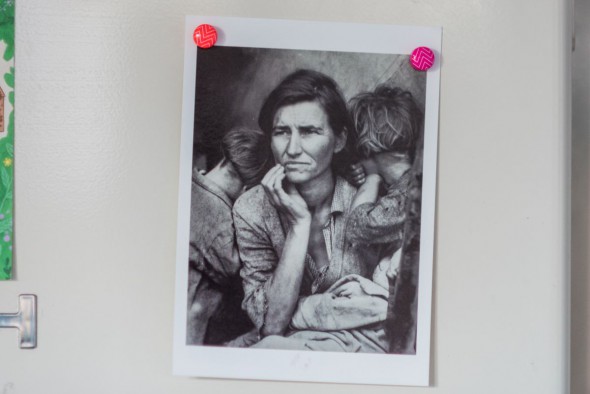Advances in technology make it easier to create immaculate images, but is this really necessary? Ben Davis wrestles with technical perfection…

I picked up a postcard of Dorothea Lange’s Migrant Mother which is now pinned to my fridge, to act as a reminder that ultimately technical perfection doesn’t matter.
Think of some of the most iconic photographs ever taken.
Perhaps you’re picturing the American sailor kissing the woman in Times Square at the end of the Second World War, or maybe Kevin Carter’s “Starving Child and Vulture”, which brought the world’s attention to the Sudan famine in 1993.
Whichever famous photo first sprang to your mind, I reckon its success is all about the impact, and how seeing it made you feel, rather than the technical aspects of the image.
Recently, I was checking out an exhibition called The Radical Eye at the Tate Modern, and I got to see Dorothea Lange’s “Migrant Mother”, depicting a forlorn-looking woman with her children during the Great Depression. It’s an image I’ve felt drawn to and admired for decades – ever since I saw it in a school textbook, way before I even considered becoming a photographer. The first thing I noticed, scrunching up my nose and really peering into the picture, was that the mother’s eyes aren’t pin sharp, and the focus is set further back nearer her ears.
“What a pity!” was the first thought to enter my head. I wondered if Lange was annoyed by the focusing, and whether if she could change it, she would? If I’d taken it, I think part of me would be a bit miffed. Whenever I look at my own images, it’s the flaws I see first and foremost. Perhaps I’m just overly self-critical, or maybe it’s an affliction of the modern age, where it’s much easier to iron out errors. We’re arguably overdosed on technically perfect pictures.
But does technical perfection really matter? Surely the primary purpose of a photograph is to tell a story and attempt to move the viewer in some way, which “Migrant Mother” certainly does. I’d suggest that being emotive is much more important than technical accuracy, but then my background is in photojournalism. If I was a fine-art, still-life studio photographer, then I’m sure my opinion would be different.
And even though I’m a firm believer that a photograph’s power resides in its content rather than its delivery, I still feel disheartened when I notice technical flaws in my shots. I find them distracting; my eye is inexorably drawn to what could be improved. I always want my pictures to be error-free, or at least as good as they can be – after all, it’s not always possible to capture a scene perfectly. The light might be against you, or you might make a mistake with the settings or handling of the camera. It happens. We’re only human. Maybe we should be striving for progress, if not perfection.
This isn’t confined to shooting. Aspirations towards technical perfection tend to step up a gear when it comes to processing shots, which for me is as much about eliminating distractions as it is enhancing tones or fine-tuning colours. I’m sure nearly every photographer does this. We remove lens distortions, reduce noise and rebalance the colour temperature, guiding the picture closer towards technical perfection. After all, our cameras and lenses are imperfect machines, and by erasing what we perceive as errors, we hope the image will become more impactful, or even somehow more “true”. How far you push this is up to you, but there is undoubtedly a point when you will stray past technical perfection and end up with an over-edited shot.

It can be easy to get lost in ensuring every technical detail is perfect. Image by David Marcu
Take a look at any online photo-sharing site and they’re bursting with spellbindingly flawless images. Scrolling through these sites always fills me with equal measures of admiration and envy. Every pixel has been polished and often the shots are about as close to technical perfection as you can get. However, while the execution is extremely admirable, it’s rare that I’m captivated by one of these images in any emotive sense. In fact, the hyperreal perfection can create a disconnect that leaves me a little cold. Maybe that’s because life isn’t perfect, and looking at highly edited images somehow feels a little false.
In yearning for technical perfection at any cost, it’s easy to forget that there can be benefits to purposefully including supposed flaws in your images. In some types of shots, imperfections are desirable. They can enhance an image by adding to the story, making them more dynamic or adding a poetic element to the capture. Think about when you select a slow shutter speed to blur movement, remove the lens hood to increase flare or boost the ISO to add grain to an image. Here technical perfection doesn’t matter – the flaws serve as tools to carry the narrative forward.
But that only works with certain images. I’m not sure the minor focusing error in Lange’s “Migrant Mother” could ever be considered intentional, or of benefit to the narrative. It’s hard for anyone to argue that her iconic shot wouldn’t be improved if the eyes were tack-sharp. But then again, its flaw has hardly held it back. Such is the power and depth of emotion in the image that any slight errors are easily forgiven – or even unnoticeable to the less pedantic eye – proving that ultimately, no matter how vain we might be about our own images, technical perfection doesn’t truly matter.
Do you agree with Ben? Join the conversation on Facebook
About the Author

Ben Davis is an award-winning professional photographer with more than 10 years' experience in the industry. His internet home is www.cambridgeshireweddingphotography.com
Related articles
Perspective: Is It Possible to Create Truly Original Photography?
Perspective: Manipulated Images Are the Mark of a Good Photographer
Perspective: What Does It Take to Be a Professional Photographer?

